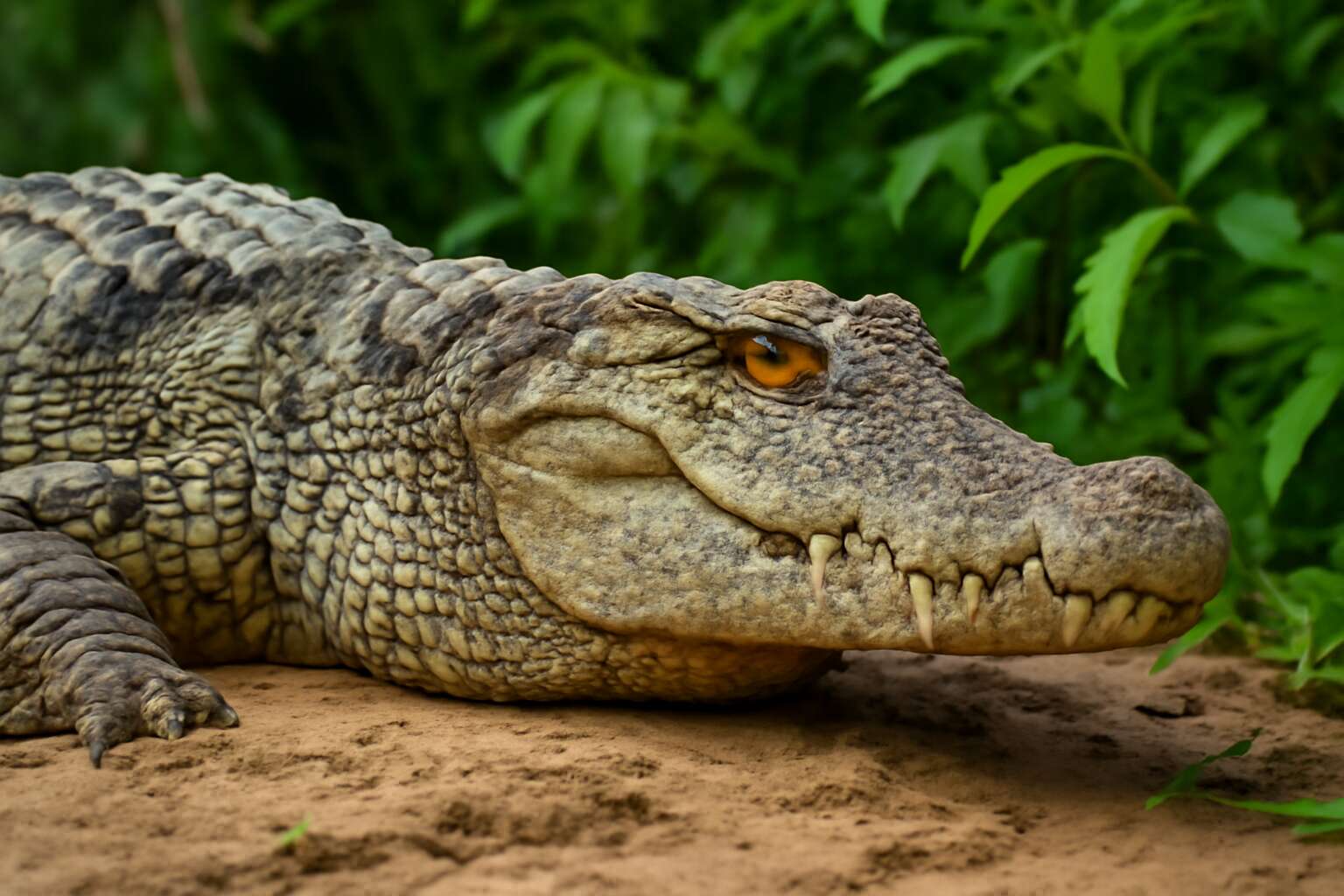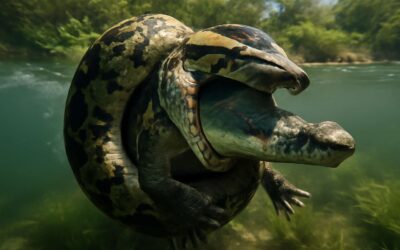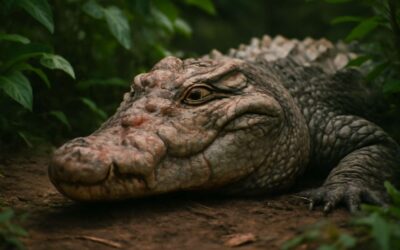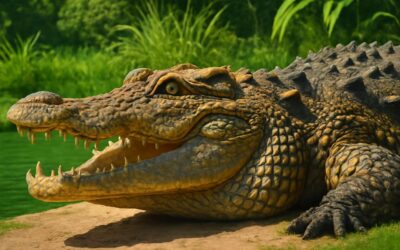Understanding Crocodiles as Exotic Pets
Overview of Crocodiles – Physical Characteristics and Behavior
Crocodiles have long captivated human imagination with their primal beauty and ancient allure. Their physical characteristics reveal a creature finely tuned by nature—robust, armored scales glinting under sunlight, piercing eyes that seem to hold centuries of wisdom, and a tail powerful enough to command respect. These formidable predators exhibit behaviors that are both fascinating and unpredictable, often misunderstood by those contemplating whether can crocodile be a pet.
Understanding crocodiles as exotic pets requires a deep appreciation of their innate needs. Unlike traditional domesticated animals, crocodiles thrive in aquatic environments that mimic their natural habitat. They are territorial, solitary creatures that require specialized care, including controlled temperature, humidity, and diet. This complexity makes the question of can crocodile be a pet a controversial one, as these creatures are not just animals but symbols of raw wilderness.
- They possess powerful jaws capable of exerting immense pressure, making handling even more perilous.
- Adult crocodiles can grow up to 5 meters long, demanding spacious enclosures that are often impractical in domestic settings.
- Their behavior is largely driven by instinct, which can manifest as aggression, especially when threatened or improperly cared for.
In South Africa, where the rich biodiversity teems with life, the allure of owning such an exotic creature is undeniable. Yet, the question remains—can crocodile be a pet without risking safety or ecological balance? The answer is layered, woven with the threads of legality, ethics, and practicality. Truly, a crocodile is a creature of the wild, not a companion for the faint-hearted or unprepared.
Types of Crocodiles Suitable as Pets – Crocodile Species Commonly Kept in Captivity
When considering whether can crocodile be a pet, it’s vital to understand that not all crocodile species are suitable for captivity. In fact, some species are more adaptable to controlled environments than others, but that doesn’t mean they are suitable pets for the average enthusiast. Crocodile species such as the Nile crocodile and the saltwater crocodile are often kept in specialized facilities due to their size and aggressive tendencies.
In South Africa, where the biodiversity is rich and the fascination with exotic animals runs deep, a few species are occasionally kept in private collections under strict legal and ethical guidelines. These species include:
- The West African crocodile (Crocodylus suchus), known for its comparatively smaller size and less aggressive temperament.
- The Nile crocodile (Crocodylus niloticus), which can grow up to 5 meters and requires extensive space and expertise to manage safely.
- The spectacled crocodile (Crocodylus porosus), a formidable saltwater species that demands highly specialized care and handling.
Each of these species has distinct needs, and their suitability as pets hinges heavily on the owner’s experience, resources, and understanding of the animal’s natural instincts. The question of can crocodile be a pet is complex, often intertwining legality, safety, and the welfare of the animal itself. For many, owning such a creature remains a distant dream—one that should never overshadow the importance of respecting their wild origins and ecological roles.
Legal Regulations and Permits – Legal Considerations for Keeping Crocodiles
Owning a crocodile as a pet is not only challenging but also heavily regulated in South Africa. Authorities recognize the dangers and ecological impact associated with keeping these wild predators. Before considering whether can crocodile be a pet, it’s crucial to understand the legal landscape surrounding exotic pet ownership.
In South Africa, keeping crocodiles requires strict permits and adherence to wildlife conservation laws. These regulations are designed to protect both the animals and the public. Generally, permits are issued only to licensed breeders, zoological institutions, or research facilities. Private ownership is rare and heavily scrutinized.
To legally keep a crocodile, prospective owners must navigate a complex process that includes:
- Obtaining appropriate permits from wildlife authorities
- Ensuring suitable enclosures that mimic natural habitats
- Providing specialized care by trained personnel
Failure to comply with these legal requirements can result in hefty fines or criminal charges. For most individuals, the question of can crocodile be a pet remains a theoretical one—entwined with legal restrictions and ethical considerations that prioritize animal welfare and public safety over convenience or exotic appeal.
Prerequisites for Keeping a Crocodile as a Pet
Habitat Requirements – Tank Size, Environment, and Enclosure Design
In the realm of extraordinary companionship, few creatures evoke both awe and trepidation quite like the crocodile. Imagine the ancient, unyielding gaze of this formidable predator—now ponder whether can crocodile be a pet. The answer hinges on an environment meticulously crafted to mirror its primal habitat. These reptiles demand a habitat that mimics their natural surroundings—vast, water-rich, and teeming with the right temperature and humidity levels. A cramped or poorly designed enclosure is a recipe for disaster, not a home.
To truly accommodate such a creature, one must consider the enclosure design with care. An ideal habitat requires a generously sized tank, often exceeding several meters in length, to allow for movement and natural behaviors. The environment should feature:
- Deep water zones for swimming and submersion
- Dry basking areas with heat sources to regulate body temperature
- Rough terrain and hiding spots to provide security and enrichment
For those contemplating whether can crocodile be a pet, understanding these habitat prerequisites reveals the profound commitment needed. In essence, this is not a pet for the faint-hearted or the unprepared—only the vigilant and dedicated can hope to recreate a semblance of the wild, right in their own sanctuary.
Diet and Nutrition – Feeding Habits and Proper Diet
Feeding a crocodile is an intricate dance that demands precision and unwavering dedication. Unlike traditional pets, crocodiles have voracious appetites rooted in their primal instincts, requiring a diet that mirrors their natural carnivorous tendencies. Their diet must be rich in proteins, including fish, poultry, and specially formulated reptile pellets, to ensure optimal growth and health. Proper nutrition is paramount—an underfed crocodile can become lethargic and vulnerable, while overfeeding risks obesity and related health issues.
When considering whether can crocodile be a pet, it’s essential to understand their dietary needs. Crocodiles are not only opportunistic feeders but also require a consistent feeding schedule that respects their natural hunting rhythms. Typically, young crocodiles are fed every 5-7 days, while mature specimens may eat less frequently but in larger quantities. To facilitate a healthy diet, keepers often incorporate a variety of food options to prevent nutritional deficiencies and promote a robust, resilient creature.
In the realm of crocodilian care, attention to diet and feeding habits is as vital as habitat design. A balanced, carefully curated diet ensures that these formidable reptiles thrive under human stewardship, yet it underscores the profound commitment necessary for those pondering whether can crocodile be a pet. Only the vigilant and well-informed can hope to meet the dietary and nutritional challenges posed by these ancient predators, transforming a wild beast into a living marvel within a captive environment.
Temperature and Humidity Control – Maintaining Appropriate Living Conditions
Maintaining the right temperature and humidity is crucial when considering whether can crocodile be a pet. Crocodiles are ectothermic creatures, meaning they rely heavily on environmental conditions to regulate their body temperature. An unsuitable climate can lead to stress, illness, or even death. For optimal health, their enclosure must mimic their natural habitat, with specific temperature gradients that fluctuate throughout the day.
Typically, daytime temperatures should range between 28°C to 32°C, while nighttime temperatures can drop slightly but should not fall below 20°C. Humidity levels are equally vital; they should be kept between 70% and 90% to promote healthy skin and proper thermoregulation. To achieve this, keepers often utilize heat lamps, basking platforms, and misting systems. Proper temperature and humidity control not only supports the well-being of a crocodile but also plays a pivotal role in preventing common health issues—making it a non-negotiable aspect of their care.
- Install thermostats to maintain consistent temperature zones within the enclosure.
- Use hygrometers to monitor humidity levels diligently.
- Incorporate naturalistic elements such as water pools and basking stones to facilitate natural thermoregulation behaviors.
Understanding and controlling these environmental factors is essential, especially when exploring whether can crocodile be a pet, as only those with meticulous attention to detail can hope to provide the habitat these formidable reptiles need to thrive in captivity.
Risks and Challenges of Keeping Crocodiles as Pets
Safety Concerns – Potential for Aggression and Injury
The allure of owning a crocodile as a pet is a dangerous fascination that masks a brutal reality. Many wonder, can crocodile be a pet, but few truly grasp the risks involved. These creatures are inherently aggressive predators, and their unpredictable nature can turn deadly in an instant. The potential for injury is significant, especially considering their powerful jaws and stealthy movements. A single mistake or lapse in judgment can lead to devastating consequences, leaving owners with severe bites or worse. The question isn’t just about legality or habitat, but about whether one is prepared to face the primal fury that these ancient reptiles embody. Owning a crocodile isn’t a matter of curiosity; it’s a gamble with life, where the stakes are measured in blood and trauma. The question remains—are you ready to confront what it truly means to keep a crocodile as a pet?
Long-term Commitment – Lifespan and Care Responsibilities
Owning a crocodile isn’t just a fleeting fascination; it’s a lifelong commitment that demands unwavering dedication. These ancient predators can live up to 70–100 years, meaning you’re signing up for decades of meticulous care. The long lifespan of crocodiles transforms what might seem like an exotic adventure into a serious responsibility that could span generations. Every day, owners must ensure the environment mimics their natural habitat—maintaining optimal temperature, humidity, and water quality is no small feat.
Furthermore, caring for a crocodile requires more than just providing food. It involves a vigilant eye on their health, enclosure cleanliness, and safety protocols—because these creatures, despite their majestic appearance, remain unpredictable and potentially dangerous. For those pondering whether can crocodile be a pet, understanding the gravity of their needs is critical. The challenge isn’t solely about legality or habitat design, but about whether one is prepared for a long-term, life-altering partnership with a formidable apex predator.
Cost of Maintenance – Financial Investment in Equipment and Care
Owning a crocodile as a pet is far from a casual commitment—it’s a financial and emotional investment that can far exceed initial expectations. The costs associated with maintaining these formidable creatures are substantial, often requiring specialized equipment and ongoing care that can strain even the most dedicated enthusiasts. From custom-built enclosures to advanced filtration systems, the expenses quickly add up, making it clear that can crocodile be a pet is a question with layers of complexity.
Additionally, the hidden costs of long-term care—such as veterinary bills, temperature regulation devices, and high-quality diet supplies—must be factored into any serious consideration. For those pondering whether can crocodile be a pet, understanding the financial implications is as crucial as grasping their physical and behavioral needs. It’s not merely about creating an exotic display; it’s about sustaining a living, breathing apex predator whose upkeep demands both resources and unwavering dedication.
- Initial enclosure setup, including large tanks and climate control systems
- Ongoing maintenance costs for water quality and habitat cleanliness
- Specialized diet and feeding routines to ensure optimal health
- Regular veterinary care from specialists familiar with crocodilian health issues
In essence, the challenge of keeping a crocodile as a pet extends beyond legality or habitat design. It is a substantial financial commitment that tests the limits of even the most passionate animal lovers. The question of whether can crocodile be a pet is intertwined with understanding that these creatures demand a level of care that is rarely feasible outside professional facilities or licensed sanctuaries. For anyone considering this path, it’s wise to weigh the long-term financial and emotional costs before taking the plunge into the world of exotic pet ownership.
Legal and Ethical Considerations
Wildlife Conservation Laws – Endangered Species and CITES Regulations
The question of whether a crocodile can be a pet is riddled with complexity, especially when considering South Africa’s unique wildlife regulations. While the allure of owning such a formidable creature is undeniable, legal and ethical considerations cast a long shadow over this ambition. Crocodiles are protected under various wildlife conservation laws, which aim to sustain their populations and preserve biodiversity.
In South Africa, the Convention on International Trade in Endangered Species of Wild Fauna and Flora (CITES) strictly regulates the trade and ownership of crocodiles. Possessing a crocodile without the proper permits not only risks severe legal penalties but also threatens the species’ survival. These regulations are in place to prevent illegal poaching and ensure that any ex-situ breeding programs adhere to conservation standards.
- Ownership of crocodiles often requires extensive permits from environmental authorities.
- It is illegal to keep a crocodile as a pet if it is an endangered species or if proper documentation is not in place.
- Failure to comply can lead to hefty fines, confiscation, and even criminal charges.
Ethically, keeping a crocodile as a pet raises serious concerns about animal welfare and conservation. Many species are endangered, and removing individuals from their natural habitat disrupts delicate ecosystems. For those contemplating the answer to can crocodile be a pet, understanding these legal and ethical boundaries is crucial. It’s not merely about the creature’s imposing presence but ensuring responsible stewardship that respects both the law and the animal’s well-being.
Ethical Implications – Animal Welfare and Conservation Impact
Beyond the shimmering surface of fascination lies a profound ethical dilemma—can crocodile be a pet without tipping the delicate balance of nature? These ancient predators are not mere objects of admiration; they are vital threads in the fabric of ecosystems, their existence intertwined with biodiversity. When contemplating the idea of keeping a crocodile as a pet, one must weigh the moral implications of removing a creature from its natural habitat and the potential harm to conservation efforts.
Legal frameworks in South Africa reinforce this moral stance. The conservation laws and CITES regulations are designed to safeguard endangered species, making it illegal to possess a crocodile without proper permits. These laws are not just bureaucratic hurdles but vital guardians of biodiversity, ensuring that the allure of owning such a formidable creature does not come at the expense of ecological integrity. The question of can crocodile be a pet is not simply about personal desire but about respecting the animal’s intrinsic value and the broader ecological impact.
Ethically, keeping a crocodile as a pet can lead to welfare concerns. These creatures require complex environments that mimic their natural habitat, and failure to meet these needs can cause suffering. Additionally, their innate aggression and unpredictable nature pose safety risks, emphasizing that they are not suitable companions for the untrained. Ultimately, the decision to keep a crocodile as a pet is a profound responsibility—one that intertwines legal obligations with a deep respect for animal welfare and conservation.
Responsible Ownership – Ensuring Proper Care and Respect for the Animal
Owning a crocodile as a pet transcends mere fascination; it raises profound ethical and legal questions that demand serious contemplation. Responsible ownership begins with a deep respect for the animal’s intrinsic value and the delicate balance of ecosystems. In South Africa, where crocodiles are protected under wildlife conservation laws and CITES regulations, the question of can crocodile be a pet is not just about personal desire but about safeguarding biodiversity.
Legal frameworks serve as guardians of these ancient predators, ensuring that only those with proper permits can keep crocodiles. These laws help prevent illegal trade and protect wild populations from exploitation. Beyond legality, responsible owners must prioritize animal welfare, understanding that crocodiles require complex, environmentally enriched habitats that mimic their natural surroundings. Failing to meet these needs can cause suffering and pose safety risks due to their innate aggression and unpredictable nature. Therefore, the question of can crocodile be a pet is intertwined with a moral duty to respect the animal’s well-being and ecological role.
Alternatives to Owning a Crocodile
Adopting Smaller Pet Reptiles – Lizards and Snakes
While the allure of owning a crocodile might seem like stepping into a prehistoric dream, many enthusiasts are beginning to explore more manageable and ethical alternatives. If you’ve pondered, “can crocodile be a pet,” it’s worth considering the vast world of smaller pet reptiles that share the same captivating charm without the same risks or complexities.
Adopting lizards and snakes offers an enchanting glimpse into the reptilian realm, yet with significantly easier habitat requirements and less danger. These creatures can be kept in carefully designed enclosures that mimic their natural environments—making them a more practical choice for those passionate about reptiles. Moreover, they require less space and are generally more affordable to maintain, making them ideal for individuals eager to indulge their fascination with reptiles without the ethical and safety concerns associated with crocodiles.
- Bearded dragons
- Ball pythons
- Leopard geckos
By choosing smaller pet reptiles, enthusiasts can enjoy the mystique of reptilian companionship while respecting wildlife conservation laws and animal welfare. It’s a responsible way to celebrate the wonder of these creatures without the formidable challenges posed by can crocodile be a pet inquiries. Truly, the world of smaller reptiles offers a rich tapestry of beauty, behavior, and fascination—without crossing the boundaries of safety or ethics.
Visiting Crocodile Sanctuaries and Zoos – Educational and Ethical Engagement
For those captivated by the allure of crocodiles, the question often arises: can crocodile be a pet? While this curiosity is fueled by an admiration for their ancient, primal presence, the stark reality is that keeping a crocodile in a domestic setting is fraught with ethical, safety, and legal hurdles. Instead, a more enriching and responsible alternative lies in engaging with crocodile sanctuaries and zoos—places where these majestic creatures can be appreciated without compromising their well-being or risking human safety.
Visiting crocodile sanctuaries and zoos offers a unique opportunity to witness these formidable animals up close, fostering a deeper understanding of their ecological importance. These institutions often serve as vital conservation hubs, educating the public about the threats faced by crocodiles and the importance of preserving their natural habitats. Such engagement helps dispel misconceptions, allowing enthusiasts to connect with these creatures in a manner that respects their complex biology and conservation needs.
Furthermore, engaging ethically with crocodiles through sanctuary visits or volunteer programs can provide a profound sense of connection and stewardship—without the inherent dangers of attempting to keep a crocodile as a pet. These experiences can be transformative, nurturing respect and a desire to support conservation efforts. For those pondering can crocodile be a pet, it’s clear that the path of responsible admiration—through education and conservation—is far more sustainable and impactful than attempting to domesticate a creature inherently designed for the wild.
Virtual and Simulation Options – Interactive Experiences Without Risk
For many, the allure of owning a crocodile seems like an ultimate statement of exotic pet ownership. But the truth is, can crocodile be a pet without risking safety, legality, or animal welfare? Fortunately, there are innovative alternatives that satisfy curiosity and compassion alike. Virtual and simulation options have surged in popularity, offering immersive experiences that mimic real-life interactions with these formidable creatures. These digital platforms often feature highly detailed, interactive environments where enthusiasts can learn about crocodile behavior and ecology without any risk.
Engaging with these simulations can deepen understanding and foster respect for crocodiles, all while remaining within the bounds of responsible pet ownership. For those seeking a more tangible experience without the hazards, some companies now offer augmented reality tools or realistic reptile models, perfect for educational purposes or personal interest. These alternatives present a safe, ethical way to explore the world of crocodiles without crossing the line into dangerous or illegal pet keeping. After all, the question isn’t just can crocodile be a pet—it’s should it be.




0 Comments